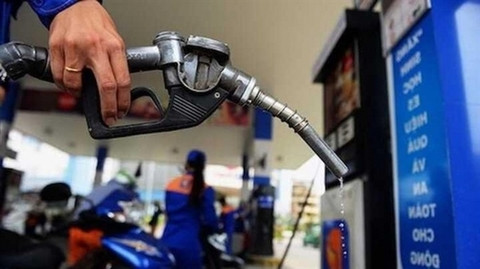
The price of RON95 bio-fuel RON95 was increased by VND921 to a maximum of VND31,578 (US$1.37) per litre from June 1. — Photo petrolimex.com.vn
From 3pm, the price of RON95 bio-fuel RON95 was increased by VND921 to a maximum of VND31,578 (US$1.37) per litre, a new record high, while E5 RON92 surged by VND602 to a maximum of VND30,235 per litre.
The price of diesel oil was upped by VND841 to a maximum of VND26,394 per litre. An increase of VND941 per litre was also seen in the price of kerosene to a maximum ofVND25,346.
This is the fifth consecutive increase in petrol prices.
Since the beginning of the year, the retail price of petrol has been adjusted up ten times and down only three times.
Hoang Van Cuong, a member of the National Assembly Delegation from Ha Noi told Nguoi Lao Dong (Workers) Newspaper on the sideline of the National Assembly meeting on Tuesday that consumers would be directly affected by petrol prices increase while the whole economy is also affected because petroleum is an input material.
A strong increase in petrol prices would affect the Government's inflation-control target, therefore, the Government must set up measures to contain the increase in petrol prices, according to Cuong.
He said to control the increase in domestic petrol prices, Government should use tax tools. Of which, the environmental protection tax could be reduced by 50 per cent.
"Reducing tax will affect budget revenues, but the Government must accept this solution to stabilise petrol prices, leading to economic recovery and development," Cuong said.
Besides that, it is possible to reduce special consumption tax, but that needs to be considered carefully because this kind of tax is related to the regulation of consumers' use of goods.
In addition to price management, Cuong said that it is also a very important factor to ensure the supply of petroleum.
He said Viet Nam is an oil and gas exploitation country with refinery and petrochemical plants which need to operate at full capacity to proactively supply and not be dependent on imports. Along with the petrol compulsory reserve and national reserve, it should also have a large volume of petroleum in stock to deal with price risks, he suggested.
A representative of the Ministry of Industry and Trade (MoIT) said that in the past, the MoIT and the Ministry of Finance took VND100-1,500 per litre depending on the kinds of petrol and oil from the oil and petrol stabilisation fund to keep stability in the domestic petrol and oil prices.
The MoIT has expected petrol demand in the second quarter of 2022 to reach about 5.2 million cu.m. Meanwhile, the petrol supply in the second quarter of 2022 has been estimated to be 6.7 million cu.m, including 3.7 million cu.m from domestic production plants of Nghi Son and Binh Son, imports of 1.5 million cu.m and an inventory of 1.5 million cu.m transferred from the first quarter of 2022.
This supply meets the demand of the second quarter and a part of the demand in the third quarter.
Total petroleum demand for the domestic market this year is estimated to be about 20.6 million cu.m.
Source: VNS